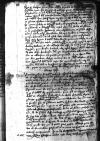Causam, quam secum adfert providus Achatius Grabow ⌊Achatius GrabowAchatius Grabow ⌋ superiori anno, quo tempore ab adversa parte, Jodok Kron (†1555), 1542-1555 Abbot of the Cistercian monastery in Pelplin (FRYDRYCHOWICZ, p. 88-90)⌊abbateJodok Kron (†1555), 1542-1555 Abbot of the Cistercian monastery in Pelplin (FRYDRYCHOWICZ, p. 88-90)⌋ et Cistercian convent in Pelplin ⌊conventu PelplinensiCistercian convent in Pelplin ⌋ in ea ad Royal Tribunal (Sąd Królewski, Tribunal Regium) ⌊tribunal regiumRoyal Tribunal (Sąd Królewski, Tribunal Regium) ⌋ appellatum fuit commendaveram, Reverendissimae Dominationi Vestrae commendaveram. Cum autem per s(erenissimam) or s(acram)⌈s(erenissimam)s(erenissimam) or s(acram)⌉ Sigismund I Jagiellon (Zygmunt I) (*1467 – †1548), King of Poland and Grand Duke of Lithuania (1506-1548); Duke of Głogów (Glogau) (1499-1506), Duke of Opava (1501-1506), Governor of Silesia (1504-1506); son of King Kazimierz IV Jagiellon and Elisabeth of Austria⌊maiestatem regiamSigismund I Jagiellon (Zygmunt I) (*1467 – †1548), King of Poland and Grand Duke of Lithuania (1506-1548); Duke of Głogów (Glogau) (1499-1506), Duke of Opava (1501-1506), Governor of Silesia (1504-1506); son of King Kazimierz IV Jagiellon and Elisabeth of Austria⌋ ad Nunc vero, postquam iuxta remissionem R s(erenissimae) or s(acrae)⌈s(erenissimae)s(erenissimae) or s(acrae)⌉ Sigismund I Jagiellon (Zygmunt I) (*1467 – †1548), King of Poland and Grand Duke of Lithuania (1506-1548); Duke of Głogów (Glogau) (1499-1506), Duke of Opava (1501-1506), Governor of Silesia (1504-1506); son of King Kazimierz IV Jagiellon and Elisabeth of Austria⌊maiestatis regiaeSigismund I Jagiellon (Zygmunt I) (*1467 – †1548), King of Poland and Grand Duke of Lithuania (1506-1548); Duke of Głogów (Glogau) (1499-1506), Duke of Opava (1501-1506), Governor of Silesia (1504-1506); son of King Kazimierz IV Jagiellon and Elisabeth of Austria⌋ inte capita et puncta quaedam interrogationum, de quibus in mandato regio mentio sit, coram Gdańsk town court ⌊iudicioGdańsk town court ⌋ et Gdańsk Town Council ⌊magistratu GedanensiGdańsk Town Council ⌋ proposuerit, ad quem a iudicio solutiones, a magistratu vero nihil obtinuit, denuo ad aulam in ea poficiscitur, sperans se nunc absolutionem et sententiam ms. diffinitivam reg. definitivam⌈diffinitivamms. diffinitivam reg. definitivam⌉ totius causae obtenturum, ut quo tandem a maximis expensis liberetur, et id, quod iuste videtur petere, consequatur.
Rogo itaque Reverendissimam Dominationem Vestram, velit Achatius Grabow ⌊illiAchatius Grabow ⌋ suo patrocinio adesse et miserum, qui iam fere totum peculium suum in ea causa exposuit, commendatum habere et ab adversa parte superinscribed in place of crossed-out non nisi⌈non nisi parte parte superinscribed in place of crossed-out non nisi⌉, ut Achatius Grabow ⌊eumAchatius Grabow ⌋ expensis fatigent, urgetur, commendatum habere idque apud Sigismund I Jagiellon (Zygmunt I) (*1467 – †1548), King of Poland and Grand Duke of Lithuania (1506-1548); Duke of Głogów (Glogau) (1499-1506), Duke of Opava (1501-1506), Governor of Silesia (1504-1506); son of King Kazimierz IV Jagiellon and Elisabeth of Austria⌊regiam maiestatemSigismund I Jagiellon (Zygmunt I) (*1467 – †1548), King of Poland and Grand Duke of Lithuania (1506-1548); Duke of Głogów (Glogau) (1499-1506), Duke of Opava (1501-1506), Governor of Silesia (1504-1506); son of King Kazimierz IV Jagiellon and Elisabeth of Austria⌋ obtinere, ut tota causa decidatur, vel per compositionem tolerabilem inter Achatius Grabow ⌊eumAchatius Grabow ⌋ et adversam eius partem componatur. In eo Reverendissima Dominatio Vestra rem Deo gratam, iustitiae convenientem, et mihi superinscribed in place of crossed-out nobis⌈nobis mihi mihi superinscribed in place of crossed-out nobis⌉ acceptam est factura Reverendissima Dominatio Vestra.
Cui cupio esse commendatissimus atque, ut eandem Dominus Deus in longissima tempora sospitet et incolumem conservet, precor ex animo.

 AAWO, AB, D. 70, f. 296r
AAWO, AB, D. 70, f. 296r